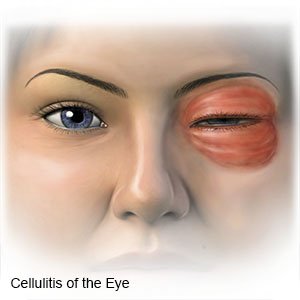Periorbital Cellulitis in Children
Medically reviewed by Drugs.com. Last updated on Aug 4, 2025.
Periorbital cellulitis, or preseptal cellulitis, is a bacterial infection of your child's eyelid or the skin around his or her eye. The infection can develop from a scratch or insect bite around the eye. Periorbital cellulitis may cause vision problems. It should be treated as soon as possible to prevent complications.
 |
DISCHARGE INSTRUCTIONS:
Return to the emergency department if:
- Your child says his or her neck feels stiff.
- Your child has a headache and is vomiting.
- Your child has blurred or double vision and cannot see well in bright light.
- Your child's infected eye bulges from his or her head.
- You see red streaks coming from the infected area.
Call your child's doctor if:
- Your child has a fever higher than 101.5°F (38.6°C) and chills.
- The red, warm, swollen area gets larger.
- Your child's fever or pain does not go away or gets worse.
- You have questions or concerns about your child's condition or care.
Medicines:
Your child may need any of the following:
- Antibiotics help treat a bacterial infection.
- Acetaminophen decreases pain and fever. It is available without a doctor's order. Ask how much to give your child and how often to give it. Follow directions. Read the labels of all other medicines your child uses to see if they also contain acetaminophen, or ask your child's doctor or pharmacist. Acetaminophen can cause liver damage if not taken correctly.
- NSAIDs , such as ibuprofen, help decrease swelling, pain, and fever. This medicine is available with or without a doctor's order. NSAIDs can cause stomach bleeding or kidney problems in certain people. If your child takes blood thinner medicine, always ask if NSAIDs are safe for him or her. Always read the medicine label and follow directions. Do not give these medicines to children younger than 6 months without direction from a healthcare provider.
- Do not give aspirin to children younger than 18 years. Your child could develop Reye syndrome if he or she has the flu or a fever and takes aspirin. Reye syndrome can cause life-threatening brain and liver damage. Check your child's medicine labels for aspirin or salicylates.
- Give your child's medicine as directed. Contact your child's healthcare provider if you think the medicine is not working as expected. Tell the provider if your child is allergic to any medicine. Keep a current list of the medicines, vitamins, and herbs your child takes. Include the amounts, and when, how, and why they are taken. Bring the list or the medicines in their containers to follow-up visits. Carry your child's medicine list with you in case of an emergency.
Manage your child's symptoms:
- Help your child wash the area with soap and water every day. Gently pat dry. Use bandages if directed by your healthcare provider.
- Remind your child to not rub or scratch his or her eye. This can increase your child's risk for spreading the infection.
- Place a cool, damp cloth on your child's eye. Use clean cloths and clean water. You can do this as often as you need to. Cool, damp cloths may help decrease pain.
- Have your child wash his or her hands often. Make sure he or she washes with soap and water after using the bathroom or sneezing. He or she also needs to wash his or her hands before eating. Use lotion to prevent dry, cracked skin.

Prevent another eye infection:
- Have your child wear proper safety equipment. Protect your child's face from injury during sports and other activities.
- Keep wounds clean and dry. Clean wounds on your child's face with soap and water. Cover wounds with a dry bandage if needed.
Follow up with your child's doctor or ophthalmologist as directed:
He or she will check if your child's cellulitis is getting better. Write down your questions so you remember to ask them during your child's visits.
© Copyright Merative 2025 Information is for End User's use only and may not be sold, redistributed or otherwise used for commercial purposes.
The above information is an educational aid only. It is not intended as medical advice for individual conditions or treatments. Talk to your doctor, nurse or pharmacist before following any medical regimen to see if it is safe and effective for you.
Learn more about Periorbital Cellulitis
Treatment options
Care guides
Further information
Always consult your healthcare provider to ensure the information displayed on this page applies to your personal circumstances.
